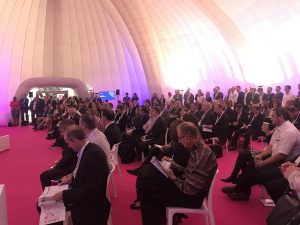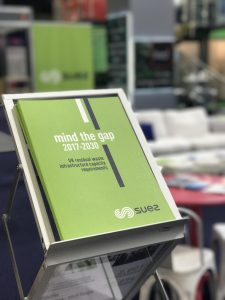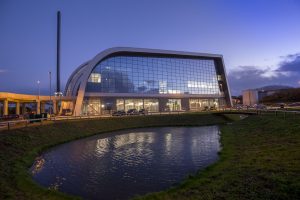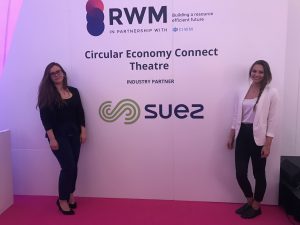Don’t miss out on RWM next year!
22nd September 2017
SUEZ’s newly appointed External Affairs Director, Dr Adam Read, shares his highlights from RWM, UK’s largest waste and resources exhibition that took place on 12-14 September 2017.
Anyone who tells you that spending time at the RWM Exhibition is “a bit of a jolly” couldn’t be farther from the mark! It was a particularly busy three days for the SUEZ team, as our CEO David Palmer-Jones and Stuart Hayward-Higham, the company’s Technical Development Director launched our latest insight report on UK waste infrastructure, entitled Mind the Gap 2017-2030, to a packed house in the Circular Economy Theatre. Judging by the number of enquiries received after the launch, which took place on 12 September 2017, the publication was well received and seen as an important addition to the ongoing debate about the residual waste infrastructure needs in the UK.

In addition to sponsoring the futuristic-looking Circular Economy Connect Theatre, SUEZ sponsored the Circular Economy networking lounge, and this proved to be an absolute master stroke. Not only was it a great way to meet the speakers, build our networks and generally build our presence, but it also meant that all of the SUEZ team could use it as a base to meet our customers and sector friends and colleagues.
For me personally it was a fantastic opportunity to meet new colleagues – after all this was only my second week in post – and this helped me to understand where SUEZ is heading and what the business model and plan look like. I am grateful to all of the team that were on site over the three days, who made me feel so welcome, but who also shared their thoughts on markets, opportunities, services and hot topics, all of which will be invaluable as I start to plan my campaigns for the coming 12 months.
SUEZ representatives took part in many panel debates. Speakers this year included Stuart Hayward-Higham on the future of EfW, David Palmer-Jones on driving industrial demand for quality secondary materials, Andy Mayo on problem materials and innovative solutions, Sarah Ottaway on the challenges of plastic recovery, Gev Eduljee on the need for positive PR for new EfW plants, Andy Hill on fire prevention plans and RDF export trends, and myself looking at innovative local authority partnerships. It really was full on, and the support team, Kat and Katie, was fabulous at making sure all of the speakers had everything they needed ahead of schedule, whilst also tweeting key messages and images from all of our sessions!
At an operational level I had a raft of meetings planned, and a few that were more opportunistic, which has also helped me get up to speed on the big issues I will be facing in my new role. Key sessions included getting to know ESA and FEAD, discussing longer term relationships and coverage with MRW, Letsrecycle.com and Recycling & Waste World journals, and discussing possible research topics with industry leaders as I start to plan the next insights report.
From an exhibition point of view, it has been a few years since I have seen anything truly innovative or disruptive, however in a matter of hours you can check out the latest developments in bins, bags, vehicles, trommels and advanced technologies. But the real value of the event is in the networking, as I have already alluded to, and in the content presented at the theatres.
For me there were a few big themes that resonated this year: 
Data
Not only were there workshop sessions dedicated to data, but we also saw the launch of a number of new reports providing new data, or new interpretations of data concerning recycling quality, waste arising, recycling rates and residual waste capacity needs. Data underpins all of the UK’s policies, services and sites, but more importantly it is critical for enabling change, for assessing options and for ensuring investors are confident about new deals. SUEZ is at the heart of this debate with the launch of the Mind the Gap 2017-2030 report, but we are also part of the DEFRA and RWM Ambassadors working group, looking to improve data sets, access and usage across the sector.
Partnerships
Another recurring theme highlighted across a number of sessions was the need for more partnerships to deliver the services and infrastructure required to meet current and future challenges in the waste and resources sector. These partnerships have historically been ‘outsourced’ but this form of contracting does not always provide the flexibility, adaptability and true sense of partnership needed in a modern world. As such we are seeing more and more successful partnerships where there are common values, agreed at the outset, and where the contract is less rigid and more a set of guidelines. This might involve a local authority owned company, a third sector partner, another local authority, a supermarket, or a waste contractor. Innovation in contracts, increasing case studies showing the savings that can be delivered, and greater evidence is helping create quite a storm around the partnership agenda, which is just as well as austerity continues to bite on all fronts!
Engagement
My final take away message from the event concerns engagement – partners, the public, your supply chain and the sector at large. One of the sessions at RWM featured the bad publicity that planned EfW plants can get, and the need for better PR in our sector. This is clearly something that SUEZ has a lot of experience with, given the successful development of new sites in Teesside, Cornwall, Suffolk and Avonmouth in recent years. I remember debating the bad press that new waste infrastructure suffered some 20 years ago, and even after working closely with DEFRA and the Welsh government over the years on improving the language and evidence base behind new waste sites, it seems that any new plant will have to be ready for a full-on assault from any of a number of campaign groups. Clearly, the UK is developing new sites and best practice in terms of planned sites, planning submissions, community engagement, and information sharing, which is now common-place But with all the new sites needed to meet our 2020 targets and beyond, we need to be smarter at engaging with communities, local authorities and campaigners about our planned services and solutions. This is something I believe SUEZ can help share with the sector in the coming months and years.

But almost as important as the siting debates is the open reporting on sites when operational. In a number of session the need for sites to be more transparent in the reporting came up, and newer sites with their visitor centres and site tours where you can see the operations up close and view the data streams live are a great way of building the confidence of the general public about planned solutions elsewhere. We must all strive to report on a range of local outputs and issues from air quality emissions to the number of lorry movements, and from on-site recycling and recovery performance to health and safety incidents. If the public sees how well-run these sites are then the concerns surrounding planning delays and local campaigning can be significantly reduced or removed. Again this is something that SUEZ is openly doing at its newer sites and I look forward to seeing this engagement in action when I visit a number of them in the coming months.
Circular Economy Hackathon
It really was a busy few days at the NEC in Birmingham and this year also saw the launch of what I hope will be an annual feature of the event: the Circular Economy Hackathon (#CEhack17). The intention was to showcase innovative ideas that use mobile technology, smart data and the ‘Internet of Things’ to deliver solutions for improving circularity in our work/sectors. SUEZ teamed up with the London Waste and Recycling Board (LWARB) and RWM to host this challenge, which was open to entrepreneurs with an emerging concept, as well as start-ups and small businesses that are developing their technology.
A call to arms went live in August for on-line submissions, with the best five entries being invited to RWM to spend the day with a range of advisors and mentors including Steve Lee, former CIWM CEO, as well as Gev Eduljee and myself. Having helped them think through their ideas, test their tools, and refine their pitches, the judging panel had the difficult task of awarding the winner with a £7,000 investment to help them push on to the next stage. Tryatec Technologies Limited was the winner, with their innovative solution enabling users to get access to a ‘newish top spec’ camera for the weekend or to test out a drone before committing to buying one. Their online platform puts tech owners and users in touch, helping to address the ever growing WEEE problem in the UK.
The platform will be launched later this year in London and they have big plans to take it to other cities and countries in due course. Well done!

So as you can see, RWM this year really was the place to be. The place for innovation, the place for networking, the place to learn a thing or two, and definitely the place to be seen and to be involved in so much of the great stuff that our sector has to offer. It was a real pleasure to be there with my new colleagues and to see just what great things SUEZ is up to in many parts of the waste and resource sector. And now I need a little rest… before we start planning next year’s RWM.
Tweet